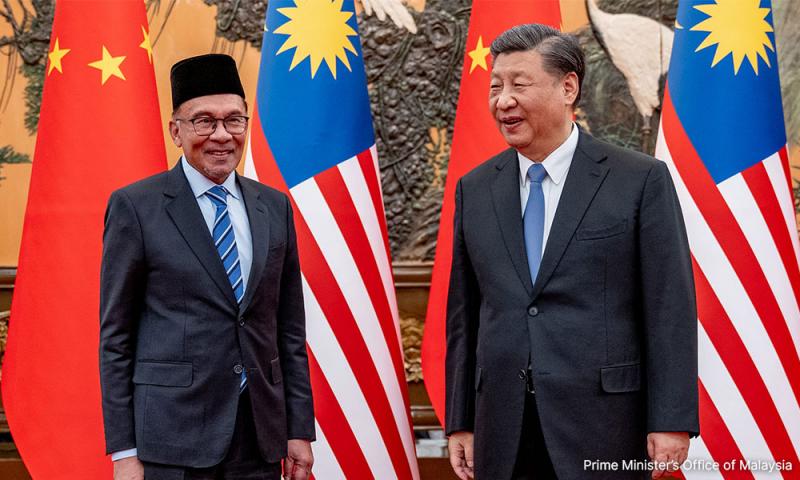LETTER | Why Malaysia needs the South China Sea
Last Saturday, Malaysia reaffirmed its strong commitment to safeguarding its sovereignty and interests in the South China Sea, following China’s expressed concern over Malaysian energy projects in an area of the sea that China also claims.
Malaysian Prime Minister Anwar Ibrahim disclosed that China had raised concerns about the activities of the state energy firm, Petronas, in a section of the South China Sea that Malaysia maintains is within its territorial waters.
But the opposition pushed back against Anwar after he claimed he was open to negotiations with China over maritime rights in the South China Sea.
His opponents claimed he was risking Malaysia’s sovereignty and offering China unnecessary and even dangerous control of Malaysia’s territorial waters.
“The government of Malaysia is unequivocally and firmly committed to protecting Malaysia’s sovereignty, sovereign rights and interests in its maritime areas in the South China Sea,” the Foreign Ministry said.
Malaysia is one of the countries that have territorial claims in the South China Sea, along with China, Vietnam, the Philippines, Brunei and Taiwan.
The South China Sea is a crucial waterway, and it is estimated that one-third of the world’s trade and billions of US dollars worth of goods pass through it, including a significant amount of Malaysia s own trade.
Therefore, Malaysia has a strategic interest in maintaining control over the South China Sea to protect its sovereignty, territorial integrity and national security.
This involves asserting its maritime rights and interests, including the exploration and exploitation of natural resources within its exclusive economic zone (EEZ) and continental shelf.
In recent years, tensions have risen in the region, with China asserting its territorial claims and building military bases on disputed islands and reefs.
This has raised concerns among neighbouring countries, including Malaysia, about China’s intentions and its impact on regional security and stability.
As such, Malaysia has been working with other claimant countries and regional powers to promote a rules-based approach to the South China Sea dispute, including respect for international law, freedom of navigation and the peaceful resolution of disputes.
This involves diplomatic efforts, multilateral negotiations, and cooperation with other countries to promote regional security and stability.
While Anwar may feel an affinity to negotiating with China, which believes it has rights to most of the South China Sea, it is essential for countries like Malaysia to maintain control of their territorial waters.
A country’s territorial waters are a crucial component of its sovereignty and territorial integrity.
The waters adjacent to a country’s coast are considered an extension of its land territory, and therefore, a country has exclusive rights to exploit and manage the natural resources within its territorial waters.
Coastal countries like Malaysia can derive significant economic benefits from the exploitation of natural resources in their territorial waters, including fisheries, oil, gas and other minerals.
Controlling these resources can provide a substantial boost to a country’s economy, promote job creation and enhance the welfare of its citizens. Maintaining control over territorial waters is essential for ensuring national security.
Coastal countries need to monitor and regulate the activities in their waters to prevent illegal activities, such as piracy, smuggling, and human trafficking, which can undermine national security.
Countries must manage their territorial waters to ensure the protection of the marine environment and biodiversity. Pollution and overfishing are significant threats to the ocean, and controlling territorial waters is essential for regulating these activities and promoting sustainable practices.
There is also the legal obligation for countries to maintain control of their territorial waters in accordance with international law. The United Nations Convention on the Law of the Sea (UNCLOS) provides a framework for defining territorial waters and establishing the rights and responsibilities of coastal countries.
Failure to maintain control over territorial waters can result in disputes with other countries and compromise a nation’s standing in the international community.
This is the very problem with China and Malaysia must stand its ground against any encroachment on its sovereign rights.
Malaysia’s citizens deserve full rights and access to their territorial waters and it is the responsibility of the government to protect those rights and not surrender them to China.
MARK LANSVIN is a strategic advisor on a range of issues for various NGOs and governments around the globe.
The views expressed here are those of the author/contributor and do not necessarily represent the views of Malaysiakini.
RM12.50 / month
- Unlimited access to award-winning journalism
- Comment and share your opinions on all our articles
- Gift interesting stories to your friends
- Tax deductable
